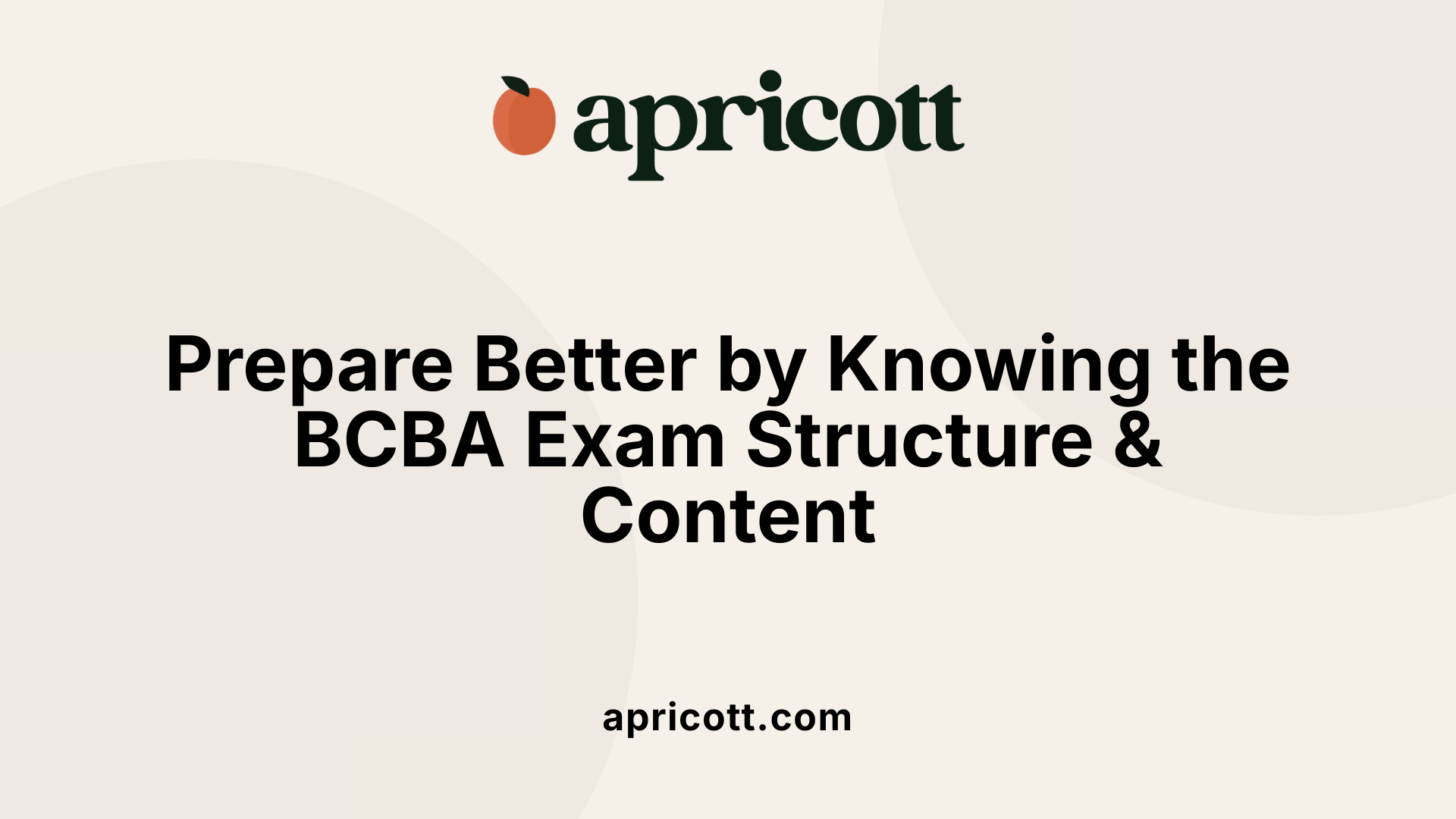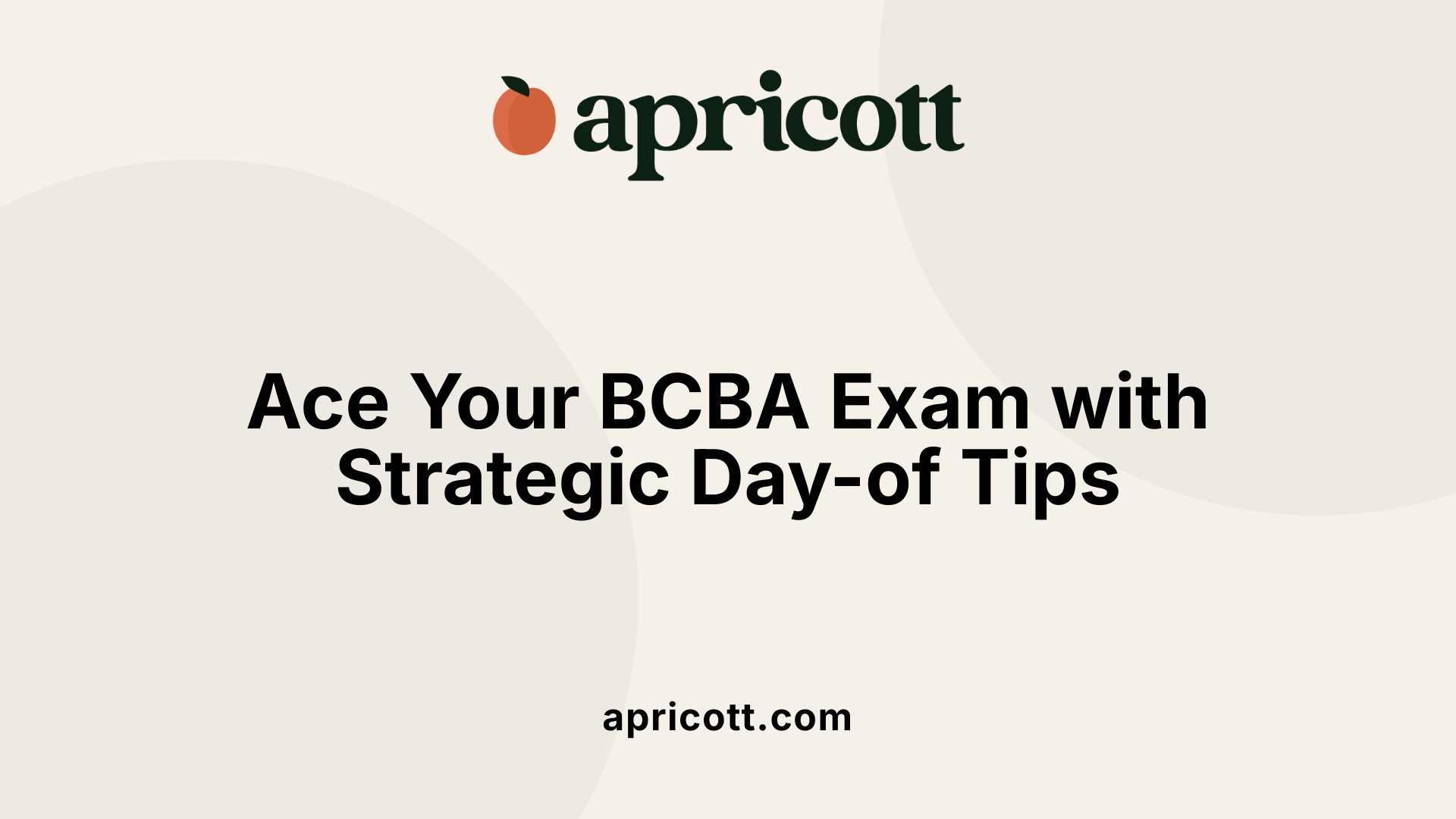July 25, 2025
Mastering Your Path to BCBA Certification
The Board Certified Behavior Analyst (BCBA) exam is a rigorous, comprehensive test designed to assess a candidate’s knowledge and application of behavior analysis principles. Achieving certification requires strategic planning, effective study habits, and practical experience. This article provides an in-depth guide to understanding the exam's structure, content, and the most effective preparation techniques to increase your chances of passing on your first attempt.

The BCBA (Board Certified Behavior Analyst) exam is a standardized, computer-based test designed to evaluate a candidate's knowledge and competency in behavioral analysis. The exam comprises 185 multiple-choice questions, out of which 10 are unscored pilot questions. Candidates are required to select the best answer from four options for each question.
Administered in person, the exam is offered at authorized Pearson VUE testing centers located across the US, Canada, Australia, and the UK. Scheduling is straightforward through a Pearson VUE account, where candidates can select preferred testing dates and pay the exam fee.
Results are made available immediately at the testing site, providing instant feedback on whether the candidate has passed or failed. Additionally, a detailed score report is emailed within approximately one week, outlining areas of strength and weakness. The exam content aligns with the BACB’s 5th Edition Task List, with a focus on testing practical skills and ethical competencies in behavioral analysis.
The passing score for the BCBA exam is a scaled score of 400 out of 500 points. This scoring system is established through a rigorous process called the modified Angoff method, which involves a panel of subject matter experts estimating the minimum level of competency needed to pass. This approach accounts for variations in exam difficulty across different administrations, ensuring fairness.
The scaled scores are the result of converting raw scores— the number of questions answered correctly— into a standardized metric. This conversion allows for consistent passing standards regardless of slight differences in exam forms or question difficulty from one test to another.
Candidates who achieve a scaled score of 400 or higher on their exam are deemed to have passed and are eligible to move forward with certification. Results are instantly available at the testing site, helping candidates receive immediate feedback. Official certification and detailed score reports are typically sent within 4 to 6 weeks.
The BCBA exam employs a scaled scoring system to ensure fairness and standardization across all test forms. While the raw score indicates the total number of correct answers, the scaled score provides a uniform measure of performance.
Scaled scores are designed to reflect a candidate’s overall competency rather than pinpointing the exact number of questions answered correctly. This means that a scaled score of 400 is a consistent benchmark, representing a passing level, but does not disclose how many questions a candidate answered correctly.
This method, based on the modified Angoff approach, helps maintain exam integrity and prevents score inflation or deflation due to slight variations in question difficulty. It ensures that passing candidates meet a consistent standard of knowledge and skills essential for effective behavior analysis.
| Aspect | Details | Additional Information |
|---|---|---|
| Score Type | Scaled score based on raw scores | Converts raw correct answers into a standard score |
| Passing Threshold | 400 out of 500 | Established via expert panel using modified Angoff method |
| Score Interpretation | Reflects overall competency, not the number of correct answers | Ensures fairness across exam forms |
| Result Timeline | Immediate at test site, official report within 4-6 weeks | Candidates receive swift feedback |
Successful preparation for the BCBA exam involves a mix of comprehensive study guides, practice assessments, and review materials that align with the BACB’s Task List. Utilize resources like the CBA Learning Module Series, which features over 3,500 questions, various learning modules, and a simulated mock exam. These materials help familiarize candidates with the exam format and content.
Attending workshops, watching targeted video lectures, and participating in test strategy sessions offered by reputable course providers can also boost readiness. Collaborative study through groups or classes promotes accountability and facilitates knowledge sharing. Many candidates turn to university-adopted programs or recognized prep providers known for high pass rates and guarantees, making consistent review and strategic study a cornerstone of success.
Utilizing proven resources ensures a structured study approach, covering all content areas thoroughly. Combining these methods often leads to more confident, prepared candidates ready for exam day.
Effective preparation starts with understanding the exam's structure and content. Begin by reviewing the BCBA handbook, paying special attention to the 9 content areas and the Ethical Code, especially section E. Taking a full mock exam early in your study process helps you establish a baseline score and identify weak spots.
Develop a flexible study schedule, ideally spanning from one to six months, focused on areas that need improvement. Prioritize studying the most challenging topics first, using resources such as the Cooper book, flashcards, and mastery modules. Practice answering questions swiftly and accurately with tools like SAFMEDS (Say All Fast Minute Everyone Donates Silence). This enhances your fluency and time management.
Incorporate real-world behavior analytic applications during study sessions to deepen your understanding. Track your progress regularly by graphing scores from mock exams and study activities to motivate continued improvement.
Refine your study habits through self-measurement techniques and positive reinforcement. Engaging in fieldwork or practical applications consolidates theoretical knowledge. Remember, consistent, deliberate practice combined with strategic review increases the likelihood of passing the exam on your first attempt.
Creating an effective study plan is essential for success. It is recommended to develop a detailed schedule that ranges from one to six months, tailored to your starting knowledge and personal commitments. Begin by assessing your strengths and weaknesses, then allocate more time to areas requiring improvement. Break down complex topics into smaller, manageable study sessions, focusing on both theoretical concepts and practical applications.
Use a calendar or planner to set specific goals for each week or month. Incorporate different study methods such as reading textbooks, watching lectures, and practicing questions to keep your approach diverse and engaging. Regularly schedule mock exams to simulate test conditions, helping you gauge your progress and adjust your study plan accordingly.
Prioritizing weaker areas identified through mock exams and self-assessment is crucial. Focus on content with higher weight in the exam, such as behavior-change procedures, but ensure all domains are covered systemically. Use study aids like flashcards, SAFMEDS (Say All Fast Minute Every Day Shuffle), and mastery modules to reinforce learning efficiently.
Allocate dedicated time blocks for study sessions, ensuring consistency. Balance study with rest and other life commitments to prevent burnout. Remember, quality study time often outweighs quantity — stay focused and avoid distractions.
Mock exams serve several vital purposes. They help establish a performance baseline, revealing which areas need more attention. Taking these practice tests under timed, exam-like conditions improves your test-taking endurance and time management skills.
They also familiarize you with the question formats and test interface, reducing anxiety and increasing confidence. Analyzing your results post-exam allows you to identify patterns — whether you are prone to making certain types of errors or struggling with specific topics. Use this data to refine your study plan and target persistent weaknesses.
Tracking your progress is essential for staying motivated and ensuring improvement. Maintain records of your mock exam scores, noting areas of strength and weakness. Use spreadsheets or dedicated apps to chart scores over time, visualizing your growth.
Additionally, monitor your study hours and mastery levels of different content areas. Implement self-measurement techniques like self-quizzing and reinforce your achievements with rewards. Regular review of your data enables you to adjust your focus and celebrate milestones, keeping your motivation high.
Set clear, measurable, and realistic goals for each study period. For example, aim to master specific topics like ethics section E or behavior principles within a set timeframe. Break larger objectives into smaller tasks to facilitate steady progress.
Use the SMART criteria (Specific, Measurable, Achievable, Relevant, Time-bound) to craft your goals. Periodically evaluate your achievements and adjust your targets as needed. Reinforce your progress by rewarding yourself for reaching milestones, fostering a positive, sustained study routine.
By combining structured scheduling, prioritized content review, consistent mock testing, diligent progress tracking, and goal setting, you can optimize your preparation for the BCBA exam and increase your chances of success.
Preparing for the BCBA exam involves developing effective test-taking strategies to enhance performance and reduce stress. A core area is question pacing. Candidates should allocate their time based on question complexity, ensuring they leave enough time to answer all questions without rushing at the end. Practicing with timed mock exams builds familiarity with the test’s timing and boosts confidence.
During the actual exam, it’s important to read each question carefully and thoroughly, paying attention to wording to avoid misinterpretation. Eliminating obviously incorrect options can improve the odds, even if unsure about the correct answer. To manage time efficiently, candidates should mark the most challenging questions to revisit later, freeing up time for questions they find easier.
Effective use of the whiteboard can significantly aid problem-solving. Candidates can use it to jot down notes, create diagrams, or highlight key points that clarify complex questions. If a question seems particularly difficult, flag it and move forward to maximize overall efficiency. Returning to flagged questions after completing the initial pass ensures that all questions are answered without unnecessary hesitation.
Taking scheduled breaks, where permitted, helps maintain focus and mental clarity. Listen to your body’s cues for rest, and use breaks to stretch, hydrate, or simply reset. Maintaining a calm, confident mindset is essential; stress can negatively impact decision-making and recall.
In summary, focusing on question pacing, practicing with realistic mock exams, using the whiteboard effectively, managing challenging questions, and utilizing breaks are practical strategies to navigate the BCBA exam successfully. Adopting these techniques can help candidates stay organized, confident, and perform at their best under exam conditions.

Successfully navigating the BCBA exam day begins with careful planning and calm execution. Arriving early at the Pearson VUE testing site is crucial. This allows enough time for check-in procedures without feeling rushed, helping to establish a confident and relaxed mindset.
Ensure you bring all required identification and testing materials, such as your approval letter and valid ID. Briefly reviewing key concepts or notes can help reinforce your knowledge just before the exam starts, reducing last-minute anxiety.
During the test, managing your time efficiently is vital. Be mindful of the clock and pace yourself so you can allocate appropriate time to each section. Use the optional breaks strategically—stretch, breathe deeply, or practice mindfulness to re-energize.
If permitted, utilize a whiteboard to jot down notes or outline questions, which can aid with focus and organization. Be sure to read each question carefully, and don’t hesitate to flag difficult questions for review later.
Maintaining confidence and staying calm are foundational to performing well. Practice deep breathing or brief mindfulness exercises if you feel overwhelmed. Remember, trusting your preparation, staying positive, and approaching each question methodically will set you on the path to success. Rest well the night before the exam, as fatigue can impair your concentration and decision-making.
Overall, exam day strategies focus on logistical readiness, mental calmness, and strategic time management, ensuring you can demonstrate your true capabilities during the test.

Immediately after finishing the BCBA exam, candidates are given their preliminary results at the testing site. These results indicate whether they have passed or failed the exam, providing instant feedback on their performance.
Official results are typically sent via email within about a week. This official notification confirms the candidate’s certification status and is necessary for updating credentials and professional records.
Once results are received, successful candidates can proceed with the certification process. The official certification, which includes the BCBA credential, is usually issued within 4 to 6 weeks after passing the exam.
For those who do not pass on their first attempt, retake policies come into play. The BACB allows retakes after certain waiting periods—commonly 60 days between attempts. Candidates must submit a new application and pay the requisite fee for each attempt.
It’s essential to carefully review the results to identify areas needing improvement, especially if planning to retake the exam. Making use of additional study resources, mock exams, and targeted review can help reinforce weak topics.
After passing, candidates should ensure all requirements are met for certification processing. This includes verifying their eligibility, submitting required documentation, and paying necessary fees.
Once certified, individuals receive their official certificate and can start using the BCBA credential in their professional practice. Ongoing requirements such as continuing education units (CEUs) must be maintained to retain certification.
Overall, understanding the steps following the exam helps candidates stay organized and motivated as they transition from exam preparation to professional certification and practice.
Practical experience, especially supervised fieldwork, forms the backbone of BCBA certification. It provides aspiring behavior analysts with the opportunity to apply theoretical knowledge to real-world situations, which is essential for developing competence and confidence in practice.
Supervised fieldwork involves working directly with clients under the guidance of a qualified supervisor. This hands-on experience helps to solidify understanding of behavior-analytic principles and enhances skills needed for effective intervention implementation.
Equally important is ongoing professional development through continuing education (CE). The BACB requires certified BCBAs to earn CEUs regularly to stay updated with the latest research, ethical standards, and best practices in behavior analysis.
Participation in workshops, seminars, and additional coursework enables BCBAs to broaden their expertise, adopt new techniques, and adapt to emerging trends in various sectors, whether in healthcare, education, or organizational settings.
Adhering to the BACB’s Ethics Code is vital. It guides practitioners in maintaining integrity, protecting client welfare, and ensuring ethical decision-making. Regular training reinforces these standards and encourages lifelong learning.
Maintaining certification is not solely about passing exams; it involves continuous growth and adherence to ethical practices. This ongoing process ensures that behavior analysts remain effective, responsible, and credible professionals.
Overall, both practical experience and continuous education are essential for a successful career in behavior analysis. They help bridge the gap between knowledge and practice, support professional development, and uphold the integrity of the field.
Including these elements in one’s professional routine promotes a high standard of service, fosters confidence, and ensures that practitioners can adapt to the evolving demands of their profession.
The integration of these aspects supports not only individual growth but also the advancement of the entire behavior analysis community, ultimately benefiting clients and society at large.
Passing the BCBA exam is a challenging but attainable milestone that requires a disciplined, strategic approach to study, practice, and test-taking. Understanding the exam's structure, content, scoring, and effective preparation methods builds confidence and competence. Remember to incorporate practical experience, utilize reputable resources, maintain a consistent study schedule, and develop strong test-taking habits. With thorough preparation and a positive mindset, you’ll be well-equipped to achieve your goal of becoming a Board Certified Behavior Analyst and advancing your career in behavior analysis.